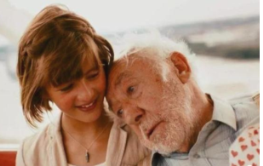题目内容
My Grandpa Forgets Who I Am

A few days ago I visited my grandfather in hospital. He has Alzheimer’s—a degenerative (退化的) disease that usually starts slowly and gets worse over time. I thought I was prepared to see him. I knew chances were slim that he’d actually recognize me.
He didn’t. As a matter of fact, he had no idea that he even had grandchildren. But he was excited that somebody came to visit him. I tried to explain to him who I was. But after he told me multiple times that he didn’t have grandchildren, I gave up. And my heart broke into a million little pieces.
I was tired of explaining things to him. So I just smiled. He smiled back. It’s a genuine smile. Like a long time ago, when he’d take me by the hand and made this big world feel a little bit less scary for me. Now I have to take his hand.
We sat in silence for a little while, before he told me to call my grandma. This was the first time I had tried so hard to hold back tears. My grandma died four years ago and he didn’t remember. He thought she was stuck on her way to pick him up.
My grandpa used to be a strong, hard-working man. He was the person you turned to when you needed your car fixed, your tires changed or something heavy to be carried. Sadly, that man left this world a long time ago, and left behind a man that is lost and scared.
I want to help him. I want to make him feel better. I want to tell him about his old life, and how great it was. So I sat with him and I held his hand, and every once in a while I told him how good he looked and how much I liked the color of his shirt and how it brought out the blue in his eyes. I told him that my grandma was on her way whenever he asked about her, and I made sure the glass in his hand was always filled with water.
I can’t take away his pain. I can’t help him remember. I can’t make the disease go away. All I can do is hold on to the memories—hold on for both of us.
1.When the author first saw her grandpa in hospital, ________.
A.she gave up on him B.they were both excited
C.he didn’t recognize her D.they talked about the past
2.The author was close to tears because ________.
A.grandma died about four years ago
B.grandpa needed to be taken care of
C.grandma didn’t make it to the hospital
D.grandpa believed grandma was still alive
3.Which of the following best describes the author?
A.Open-minded and cheerful. B.Considerate and patient.
C.Warm-hearted and grateful. D.Strong-minded and generous.
 学练快车道快乐假期暑假作业新疆人民出版社系列答案
学练快车道快乐假期暑假作业新疆人民出版社系列答案 浙大优学小学年级衔接导与练浙江大学出版社系列答案
浙大优学小学年级衔接导与练浙江大学出版社系列答案 小学暑假作业东南大学出版社系列答案
小学暑假作业东南大学出版社系列答案 津桥教育暑假拔高衔接广东人民出版社系列答案
津桥教育暑假拔高衔接广东人民出版社系列答案

 B.
B. C.
C.